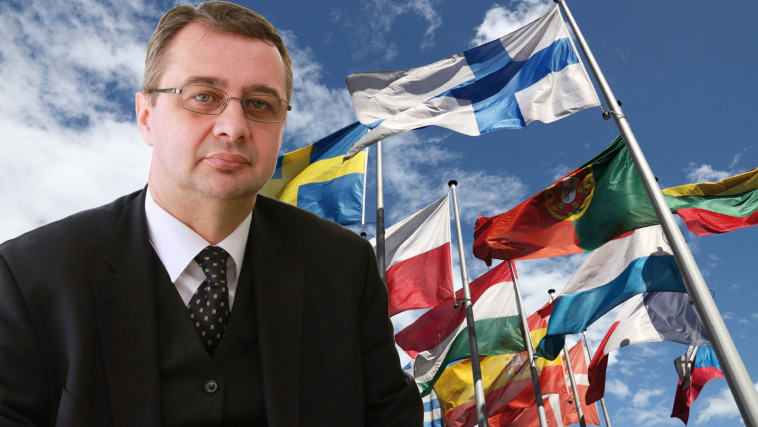Iulian CHIFU // Accept the Republic of Moldova and Ukraine in EU!

A whole apparatus of thinkers and idea creators are trying to identify the possibility to relaunch and reenergize the European project. Really, the European Union gathered overlapped crises, from the default in Greece, sovereign debt crisis across Europe, followed by the waves of immigrants, the terrorist attacks, radicalization and recruitment of unintegrated groups of French, Belgian, German, British nationals of second and third generation , who came from the colonies, their recruitment, then the foreign fighters for the theaters of terrorist operations and the lack of cohesion of Europe, until Brexit, the lack of leadership, lack of trust of the European citizen and hope in the European project. A long list and, to a great extent, an exasperating one!
The European leaders – heads of state and government – gathered in Bratislava, the capital of the holder of the half-yearly rotating EU presidency to discuss the formulas to rescue Europe. Right from the beginning, the speeches were not at all encouraging, but, on the contrary, deeply skeptical and catastrophic on the capacity to solve the European problems. The European Union is in a crisis, announced the German Chancellor Angela Merkel. Yes, the European Union might fail, stated also the president of the European Parliament, Martin Schultz. The meeting ended with the decision of the Member States to take the European project and create a roadmap until March 2017, on the celebration of the 60th anniversary of the Treaty of Rome, which launched the European communities, by addressing solutions to all the topics of concern of the European citizens.
Far from being a panacea, they are still trying to find solutions, the summit from Bratislava launched an interesting and worth watching process. Hereinafter, the service doubters, just out of the meeting, disputed without a stop the community solutions. Whether the prolongation of the sanctions on Russia, as a result of the military aggression in eastern Ukraine, have not aroused discussions this time, Viktor Orban remained deeply dissatisfied about the continuity of solutions on refugees’ issue, dissatisfaction joined also by the Polish president Yaroslav Kaczinski. As to the rest, the good intentions were not necessarily doubled by convincing solutions, although at the level of the summit, the communication of European policies was a subject.
However, we must not look too far, there is no even need to invent new integrational projects, which will pass on the idea of continuity and deepening the integration during the European project – see the controversy regarding the European Army. The assumption of the European project stays a big issue, at the national leaders’ level, with populists’ visions, nationalist visions or shady alliances with extremist and Eurosceptic parties at the Government. Nevertheless, the easiest solution remains to be the expansion politics of EU. In addition, at the West of Balkans level the reform stagnation is chronic, emphasizing new political crisis, the address to expansion in the contiguous space is the priority number one.
The Republic of Moldova and Ukraine are countries were the extinction comes naturally. In Chisinau’s case, re-launching the reforms is obvious, undisputed already at the international level. In the Ukraine’s case, a special situation combines, the pragmatic composition – defending Europe and its values by Kiev – the relevant market, the payment through loans to support the war effort, at the same time with reforms, that involves also EU states, but especially, the moral duty that Ukraine lost a part of its territory and it is at war with Russia in its Eastern regions, because chose the EU integration and for signing the Free Trade Agreement. Moreover, we will not talk about the 1994th Memorandum in Budapest, signed at the giving up of the nuclear weapons from its territory in exchange for security guarantee, where the Western countries could not keep their part of the deal and present the offered guarantees.
In both cases, the Europeans can make this effort, which is less expensive than EU is taking already by supporting the sanctions towards Russia or financially supporting Kiev, including through reform consultancy. Furthermore, 1% from the European funds of the member states would count for 30 billion euros, which could support Ukraine, are equivalent of less than 10% of the amount of money invested in saving Greece form the collapse (and the bill is not paid yet.
As for the separatism and occupied territories, in both cases – the Republic of Moldova and Ukraine – as in the Georgia’s case, which also needs, urgently, visas liberalization – I must say that in special cases, special measures are assigned; and EU learned already to manage Cyprus. A small effort for the most successful European politics, which brings profits to the member states, as well as to new future members, validates the transformation force of the EU, the capacity to go further and the will to ensure the fact that a veto right of an actor from the outside of the Union towards EU politics is not allowed and the sovereign decision of the aspiring states. A minimum effort, an acceptable discomfort and easily absorbed for a political gesture and substance visionary.














